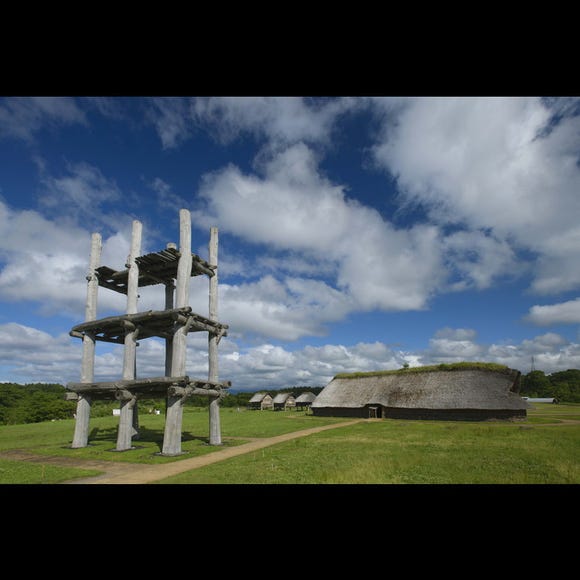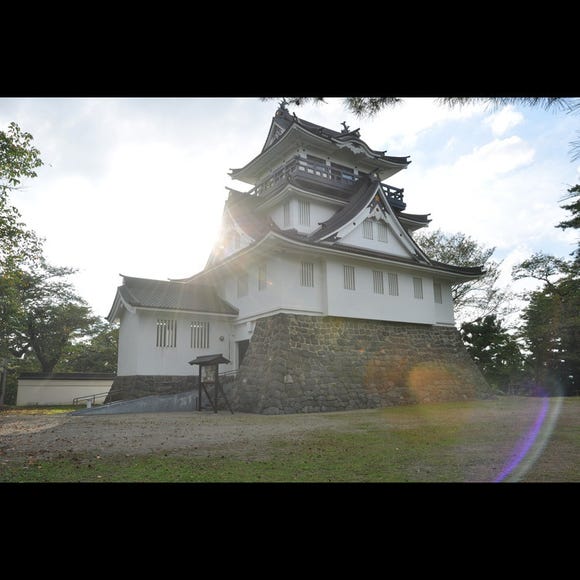
Enjoy the Gorgeous Hirosaki Cherry Blossom Festival in Aomori (April-May 2026)
- Written by: Alexander Litz
Each year, Japan sees cherry blossoms blooming as early as late February down in Okinawa. Then, over a period of three months, they work their way up Japan, finishing in northern Hokkaido in mid-May.
While many overseas visitors to Japan during this period try to get their fix of flowers in Tokyo, Kyoto, and Osaka in early April, for those who are unable to get out in the early spring, fear not, one of Japan’s biggest and most slept-on cherry blossom festivals is held from late April to early May in the northern city of Hirosaki. You won’t want to miss it!
What’s up with the Hirosaki hype? Let’s learn more about what makes the cherry blossoms in Hirosaki worth visiting one of the least-visited regions in Japan.
(Main image courtesy of Hirosaki Tourism And Convention Bureau)
Where is Hirosaki?

The northmost prefecture of Japan’s mainland of Honshu, when you say “Aomori,” the first image that comes to mind for many Japanese is apples. Hirosaki is the third-largest city in Aomori Prefecture, boasting a population of roughly 180,000, and has the only original castle in the Tohoku Region, Hirosaki Castle.
How to get to Hirosaki

Getting to Hirosaki from Tokyo is easy! Take the Hayabusa Shinkansen from Tokyo Station to Shin-Aomori Station (3 hours and 20 minutes), then transfer to the Ou Line (40 minutes) to complete the journey! The whole trip from Tokyo costs roughly 18,000 yen and is covered by the JR Pass and JR East Tohoku Area Pass.
If you’re looking to take to the air, JAL offers several flights a day to Aomori Airport (90 minutes) and then a direct bus is available from the airport to Hirosaki Station for around 1,200 yen, taking an additional hour.
For travelers on a budget, a ten-hour night bus from Tokyo to Hirosaki is quite comfortable, and during the low season, one-way tickets from companies like Willer can be as low as 4,000 yen.
When is the best time to enjoy the Hirosaki Cherry Blossom Festival?

The Hirosaki Cherry Blossom Festival will be held from April 17 to May 5, 2026. As bloom timing can vary each year depending on weather conditions, it’s best to use these dates as a general guide.
According to the Japan Meteorological Corporation, cherry blossoms in Aomori in 2026 are forecast to begin blooming around April 19, with peak bloom expected around April 22, aligning well with the festival period.
Planning a spring trip to northern Japan can also be a smart way to avoid the heaviest crowds, as many overseas visitors concentrate on Kyoto, Tokyo, and Osaka during late March and early April.
For the latest festival details, visit the official Hirosaki Park website here. You can also check current bloom conditions via Hirosaki City’s livecam links.
Where did the Hirosaki Cherry Blossom Festival Come From?

Cherry blossoms or “sakura” are no joke in Japan. In fact, for many, they are a way of life. The roots of the Hirosaki Cherry Blossom Festival trace back to the Edo Period when the Tsugaru clan planted 25 Kasumizakura cherry trees from Kyoto around Hirosaki Castle in 1715. Proud of his outstanding pink beauties, the feudal lord at the time would throw elaborate sakura-viewing parties which eventually evolved to become the Hirosaki Cherry Blossom Festival that we know and love today.
The cherry blossoms at Hirosaki Park themselves have quite a unique history as well. In the late 1800s, local horticulturists from the apple industry began experimenting with cherry blossom trees using apple-pruning techniques. While the notion of pruning cherry tree branches at the time was considered unconventional and even outlandish, the results spoke for themselves. They garnered attention nationwide and have become a standard technique adopted in Japan and beyond. Instead of each branch sprouting just a few blossoms, now, it's not uncommon to see six or seven flowers in a single branch, giving the Hirosaki cherry blossoms a fuller and more abundant look.
Today, the castle grounds are now a public park where 2,600 cherry blossom trees of over 50 varieties grace over 2,000,000 visitors who visit annually during the two-week duration of the festival.
The Oldest Somei Yoshino Trees in Japan

When you picture cherry blossoms in Japan, you are likely thinking of the cotton candy-esque trees with tufts of pink flowers and little to no leaves. These trees are of the Somei Yoshino variety and are unique in that they are cloned, cut, and grafted, meaning that their DNA is passed down generation by generation and that their petals hold not just beauty but stories.
While the typical lifespan of a Somei Yoshino tree is only 60 years, there are over 300 cherry blossom trees in Hirosaki Park that are over 100 years old! The branches of the older trees are pulled down by the sheer weight of the blossoms down to eye level, some even playfully dipping a twig or two into the water.
One of the oldest Somei Yoshino trees in Japan, planted in 1882, is a proud resident of Hirosaki Park.
-

-
Address
1, Shimoshiroganecho, Hirosaki-shi, Aomori, 036-8256
View Map -
Nearest Station
Chuohirosaki Station (Konan Tetsudo-owani Line)
15 minutes by car
- Phone Number 0172-33-8739
-
Address
1, Shimoshiroganecho, Hirosaki-shi, Aomori, 036-8256
How do we enjoy the Cherry Blossoms in Hirosaki?

Flower viewing is such a deep part of Japanese culture in the spring that asking someone where they plan to “hanami” this year could even be considered water-cooler chat 101.
So how does one hanami? The first step is to gather a good group of friends, family members, or even coworkers. In fact, many Japanese companies have dedicated time set aside for the office to go and see the flowers together as it is thought to improve company communication and teamwork.
The next step? Find a good location! Some avid flower viewers will camp out for hours to secure the best spot and the ideal environment for their hanami party.
Most important, however, is the food and drink! Japanese “yatai” street food stands are vital to the experience, yet many festival-goers opt for a nice picnic to set the mood. These picnics, called “kanokai,” can be quite elaborate, and so a service known as “Tebura de Kanokai” can be applied for well in advance. It will prepare a delicious Japanese-style picnic made from local ingredients to eliminate the hassle. Presented in a Tsugaru lacquer lunch, vegan options are also available upon request.
Best viewing spots at the Hirosaki Cherry Blossom Festival

The pinnacle of Japanese cherry blossom photos is a view of Hirosaki Castle with cherry blossoms and Mt. Iwaki in the background. One of the only 12 remaining original castles in Japan, Hirosaki Castle is small yet proudly surrounded by a moat that becomes absolutely littered pink with petals during the sakura period.
What could be more romantic than a flowery tunnel of pink blossoms? How about a boat ride through a flowery tunnel of pink blossoms? At the west moat, a small row boat that can fit up to three people can be rented for a paltry 1,000 yen for an hour and feels like a scene out of a Monet painting. Be warned, however, that during the peak festival season, the lines can get quite long, and you may even have to wait an hour or two.
The most iconic spot to enjoy the Hirosaki Sakura would undoubtedly be the cherry blossom heart cut into the sky by the wispy trees. While the heart's exact location is said to be best found on your own and publicly undisclosed, especially at night, you’ll see a crowd of people trying to get the perfect shot of the cherry blossoms against the contrasting evening sky. This photo will surely tell more than 1,000 words.
Visiting both during the daytime and at night is a completely different experience. In the evenings, the trees get lit up, transporting you to a world far beyond your wildest imagination.
What makes the Cherry blossoms in Hirosaki so Special?

Although cherry blossoms are indeed found abundantly throughout Japan, and nearly every city, shrine, or park in Japan has its own cherry blossom festival, few have as deep of a history and glow as brightly as the sakura of Hirosaki. Just as the stories carried by the branches of the Somei Yoshino pass from generation to generation, the stories of your experience in Hirosaki will be ones you’ll be telling for years, with magic, fun, and even just a little bit of whimsy along the way.

Expedition Japan
Alexander Litz moved to rural Yamagata at age 15, and even after completing his studies across Seoul, Tokyo, and Taipei, he returned to Yamagata to share his love of northern Japan with the world as a freelance writer and translator. Having explored all 47 prefectures, Alexander transitioned to a career in tourism and now is the Director of Inbound Tourism at Expedition Japan, where beyond planning and leading unique trips in rural Japan, he does inbound consulting for local and regional governments as well as travel media to help show the world the charms of a Japan less traveled. He is a Nationally Licensed Tour Conductor, holds a Bachelor’s Degree in International Relations and Asian Studies from Temple University Japan, and is a Boren Scholar at National Taiwan University.
- Area
- Category
*Prices and options mentioned are subject to change.
*Unless stated otherwise, all prices include tax.
Popular Tours & Activitiess
Recommended places for you
-

Sannai-Maruyama Site
Village Ruins
Aomori, Hirosaki And Hachinohe
-

Akiu Onsen
Hot Springs (Onsen) & Bath Houses (Sento)
Sendai And Matsushima
-

Yokote Park
Parks
Surrounding Areas Of Akita
-

Aomori Museum of Art
Art Museums
Aomori, Hirosaki And Hachinohe
-

Sendai Tanabata Festival
Japanese Festivals (Matsuri)
Sendai And Matsushima
-

Lake Tazawa
Rivers, Lakes & Canyons
Surrounding Areas Of Akita
-

Niigata Sake no Jin 2026: Guide to Japan's Most Legendary Sake Weekend
-

Shopping in Niigata: 9 Must-Buy Souvenirs & Local Sake to Take Home
by: ShiroKu inc.
-
Ad

Discover Kanazawa: History, Culture, and How to Get Around with Ease
-
Ad

Why Fukushima is the Next Big Food Destination in Japan The Foodie Paradise Only 90 Minutes from Tokyo
-
Ad

Explore Snow Country from Echigo-Yuzawa Station: A Year-Round Guide to Ski Resorts, Art, and Regional Travel
-

Aomori's Quiet Side in Autumn: 5 Scenic Spots in Hachinohe According to a Local
by: Marco Blasco
-

Togatta Onsen Guide: Best 6 Places to Indulge Yourself in Miyagi Prefecture's Magical Hot Springs Resort Village
-

10 Cherry Blossom Festivals to Enjoy in Japan's Tohoku Region in 2026
by: Guest Contributor
-

Visiting Aomori in Spring (March, April & May): Weather, What to Wear, and Late-Blooming Cherry Blossoms
by: Nemi Lin
-

Best Outlet Malls Near Sendai: Shopping, Souvenirs, and Discounts
-

10 Beautiful Places in Miyagi Prefecture to See the Cherry Blossoms in 2025
by: Alexander Litz
-

10 Important Japanese Phrases to Know Before You Enter a Japanese Convenience Store
by: Teni Wada




















